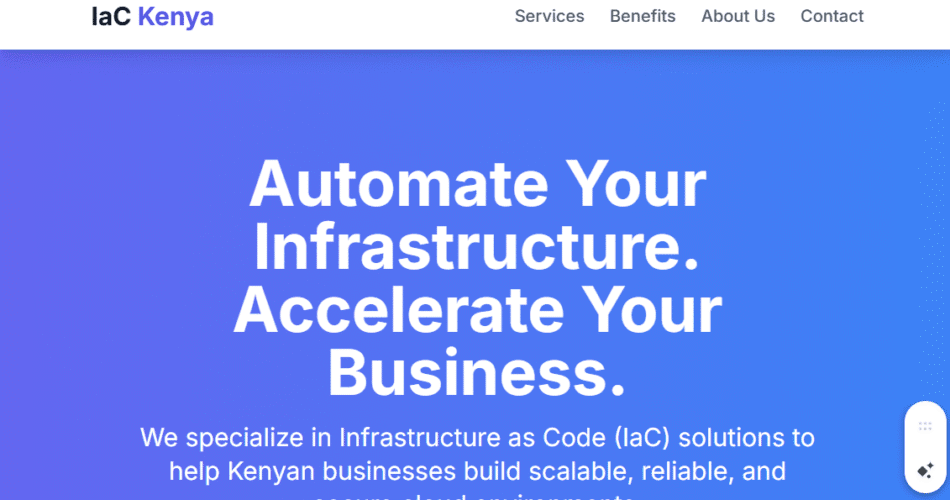IaC Services Kenya (Infrastructure as Code):
- Delivery Time2 Weeks
- English levelProfessional
- LocationUSA, United Kingdom, United Arab Emirates, New York, Nairobi, Kilimani, Kenya, Dubai, CBD Nairobi, Canada, Australia
Service Description
The cost of IaC Services (Infrastructure as Code) in kenya is 500000KES.Get IaC Services (Infrastructure as Code) in Kenya at a price of 400000KES at Black Shepherd Technologies.
Elevate your IT operations in Kenya with our Infrastructure as Code (IaC) services. Automate infrastructure provisioning, ensure consistency across environments, and reduce costs with a modern, code-driven approach. Our expert team helps you implement IaC for greater speed, reliability, and security, empowering your business to innovate faster in the dynamic digital landscape.
Infrastructure as Code (IaC) represents a transformative approach to managing and provisioning IT infrastructure, moving away from manual processes and embracing a paradigm where infrastructure is defined and managed through code. This method, which has gained significant traction globally, allows organizations to treat their infrastructure—including servers, networks, and databases—like any other piece of software. By leveraging version control systems like Git, teams can collaborate on infrastructure changes, track revisions, and automate deployment, leading to greater efficiency, consistency, and reliability.
At its core, IaC operates on the principle of declarative and imperative approaches. The declarative model, often associated with tools like Terraform and Ansible, focuses on defining the desired state of the infrastructure. The tool then intelligently determines the steps required to achieve that state, making it ideal for managing complex, multi-cloud environments. The imperative model, on the other hand, involves writing scripts that specify the exact sequence of commands to execute. While less flexible for large-scale changes, it can be useful for simpler, more direct tasks.
The benefits of implementing IaC are numerous and far-reaching. First and foremost is the significant reduction in manual errors and inconsistencies. By codifying infrastructure, organizations eliminate the “snowflakes”—unique, unrepeatable configurations that often lead to “environment drift” and deployment failures. This consistency is crucial for ensuring that development, testing, and production environments are identical, streamlining the software development lifecycle and enabling faster, more reliable releases.
Secondly, IaC dramatically improves scalability and speed. Provisioning a new server or an entire environment can be automated with a single command, as opposed to the time-consuming and labor-intensive manual process. This is particularly valuable for businesses that experience rapid growth or require on-demand resources for specific projects. The ability to spin up and tear down infrastructure with ease also makes it more cost-effective, as resources are only active when needed.
Cost optimization is another key advantage. By automating resource provisioning and de-provisioning, organizations can avoid paying for idle infrastructure. Furthermore, IaC provides a clear, version-controlled history of all infrastructure changes, making it easier to track and audit resource usage. This transparency allows businesses to make informed decisions about their cloud spending and identify areas for cost reduction.
Security and compliance are also enhanced through IaC. Security policies can be defined as code and enforced automatically across all environments, ensuring a consistent security posture. This “shift-left” approach to security, where policies are integrated early in the development process, helps prevent vulnerabilities from reaching production. Compliance requirements can also be codified and audited, providing a clear and traceable record of adherence to regulatory standards.
For organizations in Kenya, adopting IaC services can be a game-changer. The country’s burgeoning tech scene and increasing reliance on digital services make efficient and scalable infrastructure a necessity. By leveraging IaC, Kenyan companies can compete on a global scale, delivering innovative products and services with greater speed, reliability, and security. The adoption of cloud computing services in Kenya, driven by factors like affordable renewable energy and strong broadband connectivity, provides a fertile ground for the growth of IaC. IaC services can help businesses navigate the complexities of multi-cloud environments, optimize their IT operations, and focus on their core business objectives.
The implementation of IaC services involves a blend of technical expertise and strategic planning. A typical engagement would include a comprehensive assessment of the client’s existing infrastructure, followed by the selection of appropriate IaC tools, such as Terraform, Ansible, or Puppet. The next phase involves codifying the infrastructure, creating modular and reusable components, and integrating the IaC workflow into the client’s existing CI/CD (Continuous Integration/Continuous Delivery) pipeline. Ongoing support and training are also crucial to ensure a smooth transition and empower the client’s team to maintain and evolve their IaC strategy.
The shift to IaC is not merely a technical change; it’s a cultural one. It requires collaboration between development and operations teams—a core principle of DevOps. By working together on a shared codebase for infrastructure, these teams can break down silos, accelerate workflows, and achieve a more cohesive and efficient IT organization. The rise of automation, AI-powered insights, and real-time monitoring solutions further complements IaC, providing a holistic approach to modern infrastructure management.
In conclusion, Infrastructure as Code is a powerful methodology that empowers organizations to manage their IT infrastructure with the same rigor and efficiency as software development. It delivers significant benefits in terms of speed, consistency, cost, and security, making it an essential component of any modern digital transformation strategy. For businesses in Kenya, embracing IaC services can unlock new levels of agility and innovation, positioning them for success in the competitive global and local digital economy.








